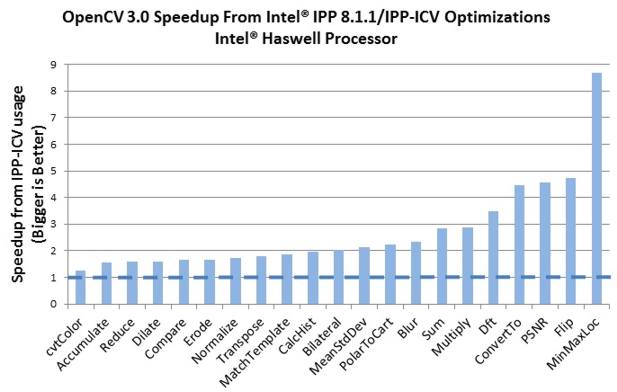| New Version of OpenCV in Alpha |
| Written by Alex Armstrong | |||
| Tuesday, 02 September 2014 | |||
|
The OpenCV team has announced OpenCV 3.x. Changes include a move to core plus plugins architecture, a lot of new functionality and optimizations that deliver a substantial speedup.
OpenCV is an open source computer vision library that is used by just about everyone experimenting not just vision but a range of image processing tasks. The announcement of the release of the OpenCV 3.0 alpha opens with a reminder of the background: It has been almost 5 years since OpenCV 2.0 has been released, which brought the completely new C++ API and started the new epoch of extensive growth of the project. During the whole 2.x lifecycle we added support of new platforms, including iOS and Android, added GPU acceleration via CUDA and OpenCL, provided complete interface to Python and Java users and built our state-of-art continuous integration system based on github and buildbot. As a result, we now have very stable OpenCV 2.4.x that’s been used in many companies and universities all over the world.
Going forward the project has an additional repository on GitHib. In future the main opencv repository will have "very stable API and probably just a little innovation" whereas the newer opencv_contrib is for "extra" modules that provide additional functionality and which may not have stable API and are less well tested and therefore won't be part of the official Open CV distribution. This wil be the location for: a lot of exciting functionality, including already known face recognition and text detection, but also text recognition, new-age edge detectors, state-of-art inpainting, depth maps processing, new optical flow and tracking algorithms etc. Not only will opencv_contrib be where most of the experimental code is put, it is also where the community is invited to contribute new algorithms. The OpenCV community is very active as this list of new functionality that will be part of OpenCV indicates:
OpenCV also has increasing industry support. GPU acceleration of many vision algorithms with a technology nicknamed T-API (transparentAPI) has come about with support from Intel and AMD and Intel has also provided a subset of its Intel Integrated Performance Primitives (IPP) to be linked by default, and for free, into Open CV. This means there's a substantial speedup for some image processing functions. In the graph IPP is compared to OpenCV with all possible optimizations turned on.
Users are invited to try out the alpha, although they are warned to expect some glitches, such as partially broken Python bindings, a few failing tests, etc, and provide feedback. The beta version is expected within a couple of months and the final release around the end of 2014.
More InformationDownload in source form as .zip package: Related ArticlesDismantle That 3D Printer - Build An Air Hockey Robot Instead! Militarizing Your Backyard with Python and AI To be informed about new articles on I Programmer, install the I Programmer Toolbar, subscribe to the RSS feed, follow us on, Twitter, Facebook, Google+ or Linkedin, or sign up for our weekly newsletter.
Comments
or email your comment to: comments@i-programmer.info
|
|||
| Last Updated ( Tuesday, 02 September 2014 ) |




